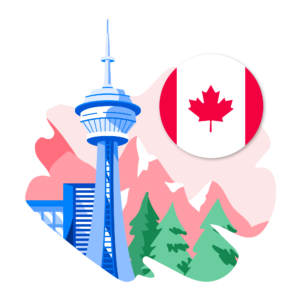For many international students, the chance to learn and grow while abroad is once-in-a-lifetime. It’s not without its challenges, but the skills you’ll pick up and people you’ll meet can balance out long nights of studying, tests, and assignments. If you’re thinking about studying early childhood education (ECE), that means you’ll train Canada’s next generation of learners and leaders. Plus, it’s a career path that’s high in demand and highly rewarding. Read on to learn more about early childhood education in Canada, including study programs and career opportunities!
What is Early Childhood Education, and why study it? Learn more on our blog.

Key Skills for Early Childhood Educators
To a casual observer, early childhood education can look like child’s play: easy and unstructured. Some might say anyone can run a game of tag, or teach children how to share crayons. However, the best educators bring a wide range of skills to work every day.
Caring and Organized
Some of the most visible skills involve care and service. ECEs tend to their students’ basic needs, nurture individual growth, and teach academic and interpersonal skills. Less visible but equally important are ECEs’ analytical skills; effective planning and information analysis are key parts of keeping any early care program running.
Safety-Conscious
ECEs work with children from infancy to age 12, according to the Government of Canada’s Job Bank. As a result, understanding and upholding safety measures and related laws that protect children are important parts of the job.
Understanding of Child Development
Knowledge of psychology is handy when working with children with different learning styles and personalities. ECEs understand how the psychological development of a child usually progresses. This allows them to spot if something is changing at an unusual pace or if there are issues.
For example, a trained ECE could “notice a delay in sound production and speech development in one of the children … As a result, they could then recommend the help of a speech therapist. Should there be any concerns regarding unusual social behavior, such as early signs of autism, a child psychiatrist could be employed in order to make a diagnosis.”
Personality Fit
People who are adaptable, professional, curious, respectful, and compassionate become excellent ECEs. It’s work that can be hard on your feet, as you’ll spend lots of time moving around. And there will be mentally tough days, too. You might have to resolve bullying situations, support students through personal challenges, or be creative with changing budgets. But the reward of watching the kids you work with change, learn, and grow can definitely be worth the hard work!

Studying Early Childhood Education in Canada
Unlike other education post-secondary programs, it’s possible to start an ECE study program with secondary school credentials, which means you can fast-track your career. This is a great option for mature students, or students with families interested in starting a home-based child care center. Becoming an ECE is also an excellent way to connect to your new community while providing a vital service.
That said, read all program application pages carefully, as some ECE programs do require an undergraduate degree. In Canada, most programs are two to four years long. Shorter programs are best for students interested in ECE assistant-level roles, and the longer programs provide additional training or dual certifications. Four-year programs can equip you to start your own early learning business or take a more senior position after graduation.
If you want to work in Ontario as an ECE, you’ll need to be licensed by the College of Early Childhood Educators. In British Columbia, ECEs must be certified by the provincial Ministry of Children and Family Development. Licensing rules vary by job title across Canada’s other provinces and territories. So as you shape your career path, check to see which certifications you’ll need.
Find open ECE programs at Canadian colleges and universities on the ApplyBoard Platform.

Working While Studying Early Childhood Education
Many ECE study programs offer co-ops or work placements. These work-integrated learning opportunities let you use what you’ve learned in-class in a support role at early childhood care organizations. Placements are also a great way to build your professional network and try different work environments. Competition for placements can be high, as placements give the students who complete them an advantage over grads without co-ops.
However, with the higher demand for workers in ECE across Canada, more colleges and universities are staying competitive by offering students paid co-op and placement opportunities. More good news? The federal government is also offering Canada Student Loans forgiveness for eligible individuals who work as ECEs in designated underserved communities.
Canadian colleges that offer paid ECE co-op opportunities include:
- Mohawk College’s Early Childhood Education program. It includes three supervised field placements, which allows students to gain hands-on experience working with children in a variety of settings, including licensed childcare centres and schools. It also has a fast-track option that allows students to complete the program in 16 months.
- Nova Scotia Community College offers a two-year Early Childhood Education diploma program with a work placement. Students in this program may participate in a paid work placement in daycare centers, preschools, or family resource centers.
- Seneca College offers paid co-ops in its Early Childhood Education diploma program, which is offered at its Toronto and King City, Ontario campuses. This program can also connect to internal pathways like an Honours Bachelor of Child Development degree.
For students who want to pursue a career in Canada after graduation, the Post Graduation Work Permit (PGWP) program is a great next step. Graduates from public colleges and universities are eligible to apply for this program.
Want to work in the province or territory you studied in? Consider applying to its Provincial Nominee Program (PNP).

Government Support for Early Childhood Educators
The Canadian federal government is also addressing the country’s ongoing need for ECEs by creating programs that alleviate the weight of student debt, encourage upskilling, and improve the quality of early education.
There are thousands of related job openings expected by 2026 as new country-wide child care agreements come into place. So, the need for ECEs is high.
Some federal projects that are shaping Canada’s early education sector:
Canada-wide ECE Workforce Strategy
In 2019, the federal government announced a C$1.2 billion investment over five years to support a Canada-wide ECE workforce strategy. This strategy aims to increase the number of qualified ECEs, improve the quality of early childhood education, and make child care more affordable and accessible for families.
Early Learning and Child Care Agreement
In 2021, the government announced a new 10-year agreement with the provinces and territories to improve access to high-quality, affordable child care. It includes C$8.3 billion in new funding. The money is focused on improving the quality of child care and increasing the number of spaces available for children.
Early Childhood Educator (ECE) Qualifications Upgrade Program
The federal government also funds the ECE Qualifications Upgrade Program. This program helps ECEs across Canada to improve their qualifications through training and professional development.
Want to study in Ontario? Check out the provincial ECE Qualifications Upgrade program page.

Some provinces and territories also offer study incentives:
- Starting a program in British Columbia? Look into the ECE Education Support Fund.
- Studying in Newfoundland and Labrador? Check out their Early Childhood Education Grants.
- Going to work in the Northwest Territories? The Bring it North! Northern Bonus provides up to a lifetime maximum of C$10,000 against your student loan (no matter which province or territory you studied in).
We hope this has helped inspire you to study early childhood education in Canada. If you’re wondering which programs to study, or where to get started, reach out to the ApplyBoard team.
Many of us have been international students ourselves. So, we’re happy to share our knowledge to support your journey.
Search our free platform for study abroad programs that match your skills.



